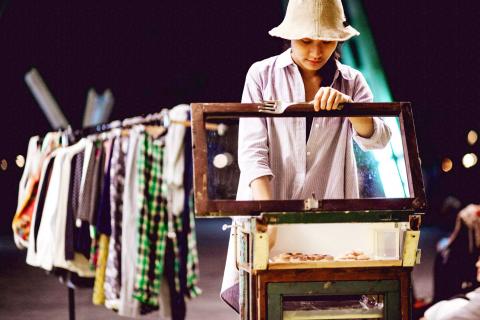It’s no secret that malls have become really popular. As soon as the weekend rolls around, the lines outside the city’s numerous malls are already spilling out to the streets — so much so that you’ll think these early morning shoppers are waiting to enter a night club.
Hoyii Main Station (Hoyii 北車站) is not your typical mall. Located next to Taipei Main Station (台北車站), Hoyii frequently holds arts and crafts markets where visitors can peruse kooky vintage items and mingle with the artisans who create them through interactive on-site workshops.
Out of the Blue/ Urban Nomad Market is one such endeavor. It will feature rotating booths split into three sections — a crafts market, an underground art exhibition and an interactive workshop.

Photo courtesy of Pilot Communications
There is handmade jewelry, vintage clothes, cartoon murals and a booth where you can get your picture taken with a clunky wooden camera that is reminiscent of a bygone era (no selfie-sticks allowed).
“The concept of ‘nomad’ was chosen because it symbolizes that art can be flowing and mobile instead of being a fixed form,” Jamilla Chen (陳妍汝) of Pilot Communications tells the Taipei Times.
As “Out of the Blue” suggests, the market is inspired by the idea of flash mobs — when a large group of people suddenly gathers at a public place to perform a dance or some form of entertainment in order to draw people’s attention to a cause or simply to brighten their day.
The hope is that setting up exhibits and interactive booths, people will be able to relate to the artisan on a deeper level and come to a greater appreciation of their craft.
As for the wooden camera booth, the artist group behind it, Life Mania (生活狂熱), believes that more can be captured in a simple black-and-white photo than snapping away with your smartphone without putting much thought into the angles or elements in the viewfinder. Whereas Life Mania believes that a picture says a thousand words, another booth is reviving vintage crafts in a different way by getting participants to write lengthy messages on old postcards and hanging them up at the exhibit.
The idea, Chen says, is for people to “preserve their present state of emotion” — something that is easily forgotten in the age of mindless instant messaging.
Moreover, it’s often the case that shoppers will walk by a dress or a bracelet they like and not think too much of why it appeals to them. The purpose of the market, however, is to enable them to understand the designer’s intentions.
“The artists present their personal life experiences and lessons from their travels in their handcrafted designs,” Chen says. “Through this, they are creating a closer relationship between people and objects.”
The market will run daily until Dec. 31.

In the March 9 edition of the Taipei Times a piece by Ninon Godefroy ran with the headine “The quiet, gentle rhythm of Taiwan.” It started with the line “Taiwan is a small, humble place. There is no Eiffel Tower, no pyramids — no singular attraction that draws the world’s attention.” I laughed out loud at that. This was out of no disrespect for the author or the piece, which made some interesting analogies and good points about how both Din Tai Fung’s and Taiwan Semiconductor Manufacturing Co’s (TSMC, 台積電) meticulous attention to detail and quality are not quite up to

April 21 to April 27 Hsieh Er’s (謝娥) political fortunes were rising fast after she got out of jail and joined the Chinese Nationalist Party (KMT) in December 1945. Not only did she hold key positions in various committees, she was elected the only woman on the Taipei City Council and headed to Nanjing in 1946 as the sole Taiwanese female representative to the National Constituent Assembly. With the support of first lady Soong May-ling (宋美齡), she started the Taipei Women’s Association and Taiwan Provincial Women’s Association, where she

Chinese Nationalist Party (KMT) Chairman Eric Chu (朱立倫) hatched a bold plan to charge forward and seize the initiative when he held a protest in front of the Taipei City Prosecutors’ Office. Though risky, because illegal, its success would help tackle at least six problems facing both himself and the KMT. What he did not see coming was Taipei Mayor Chiang Wan-an (將萬安) tripping him up out of the gate. In spite of Chu being the most consequential and successful KMT chairman since the early 2010s — arguably saving the party from financial ruin and restoring its electoral viability —

It is one of the more remarkable facts of Taiwan history that it was never occupied or claimed by any of the numerous kingdoms of southern China — Han or otherwise — that lay just across the water from it. None of their brilliant ministers ever discovered that Taiwan was a “core interest” of the state whose annexation was “inevitable.” As Paul Kua notes in an excellent monograph laying out how the Portuguese gave Taiwan the name “Formosa,” the first Europeans to express an interest in occupying Taiwan were the Spanish. Tonio Andrade in his seminal work, How Taiwan Became Chinese,